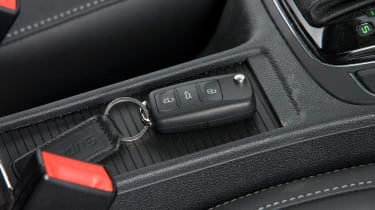Keyless car theft: what it is, how it works and tips to protect your car
The number of cars being stolen via keyless theft is increasing: here's what you can do to keep your car safe

Keyless car theft is on the rise with some of the most popular cars on the road at risk of being stolen. Cars like the Volkswagen Golf, Vauxhall Corsa and Nissan Juke are more likely to be stolen simply because there are so many of them on the road.
Whether you unlock your car via a key fob, key card or phone apps, tech-savvy criminals are discovering new ways to clone your keys, unlock your car and drive off in a matter of seconds. Thankfully, there are plenty of ways you can protect your car and reduce the risk of falling victim to keyless car theft.
Keyless car theft is one of the most common ways for thieves to steal a car. According to the Office for National Statistics, 19 per cent of vehicles were stolen as a result of keyless car theft in 2019, rising to over 58 per cent in 2024.
Car manufacturers and industry bodies are coming up with innovative new ways to combat keyless car thefts, with plenty of aftermarket car security products also available to help reduce the risk of your car getting pinched.
So how does keyless car theft work? What are car manufacturers doing to combat it? And what can you do to protect yourself and your car? Our handy guide explains it all…

What is keyless car theft?
Keyless car theft, also known as relay theft, is a way in which car thieves can unlock and steal cars without a car key being present.
To unlock your car without the key, car criminals use sophisticated, high-tech equipment which can clone, intercept and mimic your key signal, tricking your car into thinking the key is nearby.
The car thieves are then able to gain access to the car without using force or setting the car's alarm off, sometimes within a matter of seconds.
How does keyless car theft work?
First criminals search the darker regions of the internet to buy the relay amplifiers and relay transmitters needed to make the steal.
Next, thieves will target houses with desirable cars parked outside, and using their gadgets they can detect whether or not the vehicle uses a keyless entry and start system.
Working in pairs, one thief will stand by the car with the transmitter while a second carries the amplifier around the perimeter of the house. If the key is close enough, the amplifier will be able to boost its signal and direct it to the transmitter.
This transmitter then effectively becomes the key, and tricks the car into thinking the real key is nearby, whereupon the thieves are able to open the car, get in and drive away.
The whole process can take as little as 60 seconds and can be completed in near silence and as for safety reasons the engine won't just cut out when the key is out of range, there is very little to stop the thieves.
In 2025, the UK government sought to outlaw the tech, making it illegal to own signal jammers and signal repeaters. If you are caught with this tech in your possession, you would be liable for an unlimited fine and up to five years in prison.
Are keyless cars easier to steal?
Unfortunately there is no straightforward answer to this question as there are a few different types of keyless car system available.
Some models have keyless entry that unlocks the doors when the key is close-by but still have a conventional key that is physically put in the ignition to start the car, while others will have keyless entry combined with keyless start.
The cars most at risk of relay theft are ones with keyless entry and start. Keyless entry and start systems allow the owner to unlock, start the car and drive away without ever taking the key out of their pocket or needing to insert it into the ignition. If a car thief can clone the signal from the key, they can do the same.

How are car manufacturers tackling keyless car theft?
Keyless car theft is nothing new, so manufacturers and industry bodies have been working on ways to combat it for a while. This means that even if a car has keyless entry and start, newer and more advanced models will have systems that are designed to thwart thieves.
Some older models with keyless start are vulnerable because they might not have the latest security features and are more easy to steal than cars which don’t have keyless entry systems of any kind.
The general improvement in car security in recent years has seen more car thieves resort to breaking into houses to get the keys for cars because taking the vehicle without the key has become so much more difficult.
Some types of car are stolen more than others. It's hard to say with certainty whether one model of car with a certain type of technology is easier to steal overall than another. What you should always do is take every sensible precaution available to you to reduce your risk of getting your car stolen.

Top tips on how to avoid keyless car theft
Keyless car theft sounds almost like the perfect crime, but that doesn’t mean there aren’t steps you can take to reduce the likelihood of your car being stolen this way.
Below we’ve outlined a few ways to protect you and your car from keyless theft. We have a dedicated page which looks at different car security products in more detail, the costs and how you can best protect your car.
Keep your car locked
Owners shouldn’t forget to take standard security measures. Ensure your car is properly locked when unsupervised, and keep keys far away from doors and windows.
This will minimise the chances a crook will be able to find and amplify the key’s signal and is generally good practice. It will also prevent thieves from easily breaking in and swiping them.
Invest in signal-blocking boxes or Faraday pouches
Consider purchasing a Faraday pouch or box to keep your car key in. These pouches contain signal-blocking materials that stop your key transmitting its code, preventing crooks from being able to detect and amplify the signal.
In 2020, a Thatcham spokesman told us owners should be cautious about these bags, saying: “We have tested a few of the pouches and the ones we’ve assessed have worked, but we can’t guarantee they all will. Some pouches have two pockets, for example, only one of which will block signals, while there are so many on the market it’s simply not possible for us to test them all.”
If you buy a Faraday pouch, it’s best to check that it sufficiently blocks your car key’s signal. You can check to see if it works by putting the key in the pouch or box and if your car doesn’t open when you approach or stand next to it with the key in the pouch, then it works.
We have tested a number of key signal blockers and Faraday bags to find the best on the market. You can find out which one came top in our Faraday bag product test.
Install physical barriers
There are different aftermarket security devices which you can purchase which act as a physical barrier against car thieves.
Steering wheel locks, a driveway parking bollards or even a wheel clamp are great physical and visual deterrents. Even if the thieves are able to access and start your car, physical barriers should prevent them from driving away.
Many criminals will consider bypassing cars with these deterrents on as they're seen as too much hassle to remove and require additional tools, increasing the odds of getting caught.
GPS tracking devices
If your car is stolen then you have a higher chance of it being recovered by the police if you have a GPS tracking device fitted.
Tracking devices can be fitted discreetly to your car, but it’s worth remembering that most car thieves will look for a GPS tracker shortly after stealing a car so it needs to be hidden in a place which isn’t accessible.
Switch off your keyless entry system
More and more car manufacturers now give you the ability to turn off part, or all of the vehicle's keyless entry and start system.
For example, Ford owners can turn off their car's keyless entry system from within the vehicle settings menu on the driver’s digital display. This means you will need to press the unlock button for your car to open, rather than just being in proximity with the key and the car automatically unlocking.
BMW has also introduced key fobs which automatically go into ‘sleep mode’ if the key doesn’t detect any movement after a few minutes. This means the key won’t emit a signal, rendering illegal signal boosters ineffective.
If you want to see if you can turn off your keyless entry and start system, consult your vehicle's handbook or contact your local dealer.
How else can you prevent keyless car theft?
Other steps you can take to keep your car safe include checking if there are any software updates for the car itself and remaining vigilant for unusual activity in your area.
If you’re away from home, park in well-lit areas, down busier roads and in view of any CCTV security cameras. Many car thieves are opportunists and are less likely to attempt to steal a car if it’s in an area where they might get caught or spotted in the act.
Our dealer network has 1,000s of great value new cars in stock and available now right across the UK. Find your new car…








